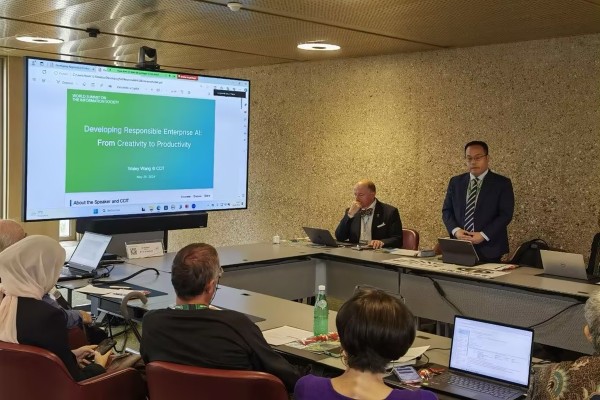
- Home
- Media Center
-
Events
- Wuzhen Summit
- Regional Forums
- Practice Cases of Jointly Building a Community with a Shared Future in Cyberspace
- World Internet Conference Awards for Pioneering Science and Technology
- The Light of Internet Expo
- Straight to Wuzhen Competition
- Global Youth Leadership Program
- WIC Distinguished Contribution Award
- Membership
- Research & Cooperation
- Digital Academy
-
Reports
- Collection of cases on Jointly Building a Community with a Shared Future in Cyberspace
- Collection of Shortlisted Achievements of World Internet Conference Awards for Pioneering Science and Technology
- Reports on Artificial Intelligence
- Reports on Cross—Border E—Commerce
- Reports on Data
- Outcomes of Think Tank Cooperation Program
- Series on Sovereignty in Cyberspace Theory and Practice
- Other Achievements
- About WIC
- 中文 | EN

Responsible AI needs further collaboration

Wang Lei (standing), chairman of Wenge Tech Corporation, talks to participants at the World Summit on the Information Society. [Photo for China Daily]
Further efforts are needed to build responsible artificial intelligence by promoting technological openness, fostering collaboration and establishing consensus-driven governance to fully unleash AI's potential to boost productivity across various industries, an executive said.
The remarks were made by Wang Lei, chairman of Wenge Tech. Corporation, a Beijing-based AI company recognized by the Ministry of Industry and Information Technology as a "little giant" firm—novel and elite small and medium-sized enterprises that specialize in niche markets. Wang delivered his speech at the recently concluded World Summit on the Information Society.
"AI has made extraordinary progress in recent years. Innovations like ChatGPT and hundreds of other large language models (LLMs) have captured global attention, profoundly transforming how we work and live," said Wang.
"Now we are entering a new era of Artificial General Intelligence (AGI). Enterprise AI has proven to create significant value for customers in fields such as government operations, ESGs, supply chain management, and defense intelligence, excelling in analysis, forecasting, decision-making, optimization, and risk monitoring," he added.
A recent report from the think-tank a16z and IDC reveals that global enterprise investments in AI have surged from an average of $7 million to $18 million, a 2.5-fold increase. In China, the number of LLMs grew from 16 to 318 last year, with over 80 percent focusing on industry-specific applications, Wang noted.
He predicted a promising future for Enterprise AI, with decision intelligence being the ultimate goal. "Complex problems will be broken down into smaller tasks, each resolved by different AI models. AI agents and multi-agent collaboration frameworks will optimize decision-making strategies and action planning, integrating AI into workflows, data streams, and decision-making processes within industry-specific scenarios."
Wang proposed a three-step methodology for successful Enterprise AI transformation: data engineering, model engineering, and domain engineering.
"To build responsible AI, we must address several challenges head-on," he emphasized. "Promoting technological openness can reduce regional and industrial imbalances, fostering collaboration can mitigate unfair usage restrictions, and establishing consensus-driven governance can significantly enhance AI safety."

The World Internet Conference (WIC) was established as an international organization on July 12, 2022, headquartered in Beijing, China. It was jointly initiated by Global System for Mobile Communication Association (GSMA), National Computer Network Emergency Response Technical Team/Coordination Center of China (CNCERT), China Internet Network Information Center (CNNIC), Alibaba Group, Tencent, and Zhijiang Lab.





